Contradictions In The Bible: Unraveling The Mysteries And Finding Answers
Let’s dive right into it, folks. The Bible, one of the most influential books in human history, is no stranger to debate. And let’s be real, when we talk about contradictions in the Bible, it’s like opening up Pandora’s box. You know what I mean? It’s not just a book; it’s a collection of stories, teachings, and history that has shaped cultures, laws, and lives for centuries. But here’s the kicker—people often point out apparent inconsistencies in its text. Today, we’re gonna explore these so-called contradictions in the Bible and try to understand them from different perspectives. So, buckle up!
Now, before we go any further, let’s clear the air. This ain’t about bashing or defending the Bible. We’re here to have an honest conversation. Contradictions in the Bible have been a topic of discussion for ages. Scholars, theologians, and even regular folks like you and me have wrestled with these questions. Why do some parts seem to clash with others? Why does it matter? Stick around, and we’ll break it down step by step.
One thing’s for sure: this isn’t just about religion. It’s about understanding the complexities of an ancient text that has been translated, interpreted, and reinterpreted countless times. So, whether you’re a believer, a skeptic, or just plain curious, this article’s got something for everyone. Let’s roll!
- Loretta Lynns Birth The Life And Legacy Of A Country Music Icon
- Exploring The Early Life Of Anthony Kiedis A Journey Through His Youth
What Are Contradictions in the Bible?
Alright, let’s get the basics out of the way. When we talk about contradictions in the Bible, we’re referring to passages that appear to conflict with one another. For instance, one part might say something, while another part seems to say the opposite. Sounds confusing, right? But here’s the thing: context matters. A lot.
These contradictions can pop up in various forms. Sometimes, it’s about numbers—like how many people were involved in a specific event. Other times, it’s about timelines or even moral teachings. The key is to understand why these differences exist and how they’ve been addressed over time.
Now, you might be thinking, “If there are contradictions, does that mean the Bible isn’t trustworthy?” Hold that thought. We’ll get to that later. For now, let’s focus on identifying some of the most common contradictions and see what’s really going on.
- Joe Gilgun Wife 2024 A Deep Dive Into His Personal Life
- Passion Twist Bob Hairstyles A Trendy And Versatile Look For Every Occasion
Common Examples of Contradictions in the Bible
Let’s dive into some examples, shall we? Here are a few that often come up in conversations:
- Creation Stories: Genesis 1 and Genesis 2 seem to offer two different accounts of creation. In one, everything is created in six days, while the other focuses more on Adam and Eve.
- Jesus’ Genealogy: The Gospels of Matthew and Luke present different genealogies for Jesus. How does that work?
- The Age of Solomon’s Temple: Some passages suggest it was built in different years, depending on which book you’re reading.
- David’s Census: In 2 Samuel, God gets angry because David takes a census, but in 1 Chronicles, it’s Satan who incites him to do it. Wait, what?
See what I mean? These examples might seem contradictory at first glance, but there’s more to the story. Let’s break it down further.
Why Do Contradictions Exist?
Here’s the deal: the Bible wasn’t written by one person in one sitting. It’s a compilation of writings from different authors, spanning centuries. Each writer had their own style, audience, and purpose. That’s why we see variations in how certain events or teachings are presented.
Plus, let’s not forget the cultural and historical context. Back in the day, people didn’t have access to the same tools we do now. Oral traditions played a huge role in preserving stories, and things could change slightly as they were passed down. It’s like playing the telephone game—by the time the message gets to the end of the line, it might sound a little different.
Another factor to consider is translation. The Bible has been translated into countless languages over the years, and translations aren’t always perfect. Words and phrases can lose their original meaning or take on new interpretations depending on the language and culture.
How Have Scholars Addressed Contradictions in the Bible?
Scholars have been tackling these questions for centuries, and they’ve come up with some pretty interesting insights. Here are a few approaches:
Harmonization
Harmonization is all about finding ways to reconcile seemingly conflicting passages. For example, when it comes to the creation stories in Genesis, some scholars argue that they’re not meant to be taken literally but rather as complementary accounts that emphasize different aspects of creation.
Source Criticism
This approach looks at the different sources used to compile the Bible. For instance, the Documentary Hypothesis suggests that the Pentateuch (the first five books of the Bible) was written by multiple authors with distinct styles and perspectives. Understanding these sources can help clarify why certain passages seem to contradict each other.
Historical Context
Putting passages in their historical context can also shed light on apparent contradictions. For example, the differences in Jesus’ genealogies in Matthew and Luke might reflect the authors’ different audiences and purposes. Matthew, writing to a Jewish audience, emphasizes Jesus’ connection to King David. Luke, writing to a Gentile audience, highlights Jesus’ universal appeal.
Does the Presence of Contradictions Invalidate the Bible?
Now, here’s the million-dollar question: if the Bible has contradictions, does that mean it’s not reliable? Not necessarily. Think about it this way: just because a book has a typo or two doesn’t mean the whole thing is useless. Similarly, the presence of contradictions doesn’t automatically discredit the Bible’s overall message.
What matters is how we interpret these contradictions. Are they genuine errors, or are they differences in perspective, translation, or context? Many believers argue that the Bible’s authority lies in its spiritual truths, not in every single detail being perfectly consistent.
That being said, it’s important to approach the Bible with an open mind and a willingness to explore different viewpoints. Whether you’re a believer or not, understanding these complexities can deepen your appreciation for this ancient text.
Modern Perspectives on Contradictions in the Bible
In today’s world, people approach the Bible in different ways. Some see it as the literal word of God, while others view it as a collection of stories and teachings that offer moral and spiritual guidance. Modern scholarship has also played a significant role in shaping how we understand the Bible.
For instance, many scholars now emphasize the importance of understanding the Bible’s literary genres. Some parts are historical narratives, others are poetry, and still others are prophetic writings. Recognizing these differences can help us make sense of apparent contradictions.
Additionally, advances in archaeology and linguistics have provided new insights into the Bible’s historical and cultural context. These discoveries can help clarify passages that once seemed confusing or contradictory.
How Can You Study Contradictions in the Bible?
If you’re interested in exploring contradictions in the Bible for yourself, here are a few tips:
- Read Different Translations: Comparing translations can help you see how certain passages are interpreted differently.
- Study the Context: Always consider the historical, cultural, and literary context of a passage.
- Consult Scholarly Resources: Books, articles, and online resources from reputable scholars can provide valuable insights.
- Engage in Discussion: Talking to others about your findings can deepen your understanding and challenge your assumptions.
Remember, studying the Bible is a journey, not a destination. Be patient with yourself and open to learning new things.
Does Science Conflict with the Bible?
One common misconception is that science and the Bible are always at odds. While there are certainly areas where they seem to clash—like the age of the Earth or evolution—it’s not as black and white as some people make it out to be.
Many scientists and theologians have found ways to reconcile science and faith. For example, some argue that the Bible’s creation story is more about the “why” of existence, while science focuses on the “how.” Others see no contradiction at all, viewing science as a way to better understand God’s creation.
The key is to approach both science and the Bible with humility and a willingness to learn. After all, they’re both ways of understanding the world around us.
Conclusion: Embracing the Complexity of the Bible
So, there you have it, folks. Contradictions in the Bible might seem daunting at first, but they’re actually an invitation to explore deeper questions about faith, history, and human understanding. Whether you’re a believer, a skeptic, or somewhere in between, this journey can be enriching and eye-opening.
Here’s the bottom line: the Bible is a complex, multifaceted text that has shaped the world in countless ways. Its contradictions don’t have to be seen as flaws but as opportunities to grow in knowledge and understanding.
So, what’s next? I encourage you to dive deeper into these questions, whether through reading, discussion, or prayer. And hey, if you found this article helpful, don’t forget to share it with your friends. Who knows? You might just spark a meaningful conversation. Peace out!
Table of Contents
- Contradictions in the Bible: Unraveling the Mysteries and Finding Answers
- What Are Contradictions in the Bible?
- Common Examples of Contradictions in the Bible
- Why Do Contradictions Exist?
- How Have Scholars Addressed Contradictions in the Bible?
- Does the Presence of Contradictions Invalidate the Bible?
- Modern Perspectives on Contradictions in the Bible
- How Can You Study Contradictions in the Bible?
- Does Science Conflict with the Bible?
- Conclusion: Embracing the Complexity of the Bible



Detail Author:
- Name : Ward Mitchell MD
- Username : labadie.isabella
- Email : crooks.mozell@gmail.com
- Birthdate : 1992-04-21
- Address : 5479 Grimes Mount Suite 749 South Melyssa, NM 76359-5321
- Phone : +1-442-990-7095
- Company : Goodwin, Torphy and Connelly
- Job : Insurance Claims Clerk
- Bio : Quia perferendis dolorem suscipit omnis illo. Aperiam non rerum voluptatum et adipisci. Aliquid at in nulla quisquam beatae. Qui voluptatem qui officia dolor quo autem.
Socials
instagram:
- url : https://instagram.com/rogahn2016
- username : rogahn2016
- bio : Est consectetur nesciunt dolore sint aut. Ea quia eligendi ea aut.
- followers : 106
- following : 540
facebook:
- url : https://facebook.com/ines_dev
- username : ines_dev
- bio : Nemo cumque ut nihil non aliquid aut.
- followers : 2834
- following : 1613
linkedin:
- url : https://linkedin.com/in/ines_rogahn
- username : ines_rogahn
- bio : Et et quia sit ut nihil.
- followers : 1127
- following : 1704